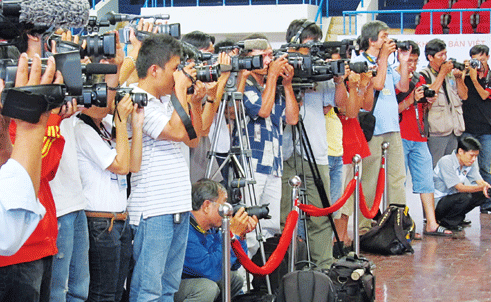(VOVworld) - Certain dissident organizations and individuals have distorted information about Vietnam, saying the government stifles freedom of speech and the press and restricts the internet. In its annual report released just before World Press Freedom Day on May 3rd, Freedom House listed Vietnam among countries that have no press freedom. VOV’s Thu Hoa reports on lively press and internet activities in Vietnam which contradict the misrepresentations made by foreign antagonists.
Since the country’s renewal process began in 1986, the Vietnamese Party and State have always paid special attention to the development of the press and other mass media in Vietnam. As of last March, Vietnam had 17,000 licensed journalists, triple the number it had in 1986, and thousands more should get their licenses very soon. Vietnam has 786 print media agencies which publish more than 1000 varied publications, and 67 national or provincial television and radio stations. In addition to disseminating information on Party and State policies and guidelines, the media have always given attention to promoting democracy, actively taking part in social criticism and contributing to the Party’s policy-making process and the government’s fight against corruption and social evils. Vietnam’s media have always provided a forum to promote the people’s rights to be the country’s masters and enjoy freedom of speech. It also serves as an important information channel linking the Party and State with the people.

Press freedom is protected in Vietnam |
There are no “forbidden zones” for the Vietnamese media. The media reflect honestly and objectively all aspects of life in Vietnam, both positive and negative issues, and domestic and international developments alike. All forms of journalism: radio, television, print, and online newspapers are developing.Since the country first accessed the global internet 10 years ago, Vietnam has gained 27 million internet users, 31% of the population. Director of Hanoi’s Nhat Cuong Software Company Pham Quoc Nhat said: "Vietnam is among the countries with the fastest information technology growth. The internet is now being accessed in even the most remote areas. This has been acknowledged worldwide. We can say that we are able to access any information we need from the internet. So it’s not correct to say the internet is restricted in Vietnam."
It’s not a coincidence that Vietnam has become the country with the fastest internet growth in the region and among the countries with fastest internet growth in the world. This is due to the Party and State’s special attention to the development of this field, says Luu Vu Hai, General Director of the Department of Radio – Television and Electronic Information Management under the Ministry of Information and Communications. However, Hai added that, like other countries, Vietnam has its own regulations for the use of the internet to protect the country’s traditions and customs as well as national security. Mr Hai said: "Vietnam encourages the use of the internet in economics, culture, and society, to improve work efficiency. The country has created favorable conditions for organizations and individuals to provide and use internet services. We also strengthen the dissemination of laws on internet use. Vietnam has devised ways to prevent activities taking advantage of the internet to compromise the country’s security, violate its traditional moral principles or laws, and protect children from harmful influences."
Yaima is a Spanish woman who has lived for many years in Vietnam. She says statements about Vietnam’s restriction of the internet are not objective. She says that as far as she is concerned, Vietnamese and foreign visitors can easily access the internet. Ms. Yaima told VOV: "Since I came here, I have never had any difficulties accessing the internet. I can connect easily with my relatives home. I think every country has its own regulations for internet development in accordance with that country’s desires and interests."
It’s easy to see that Vietnam has never considered the internet its enemy as claimed by the group “Reporters without borders” in their annual report for 2012. The development of internet and press activities in Vietnam shows that the country’s freedom of press is not only ensured by the country’s legal system and favorable policies and mechanisms devised by the government, but is also reflected in daily activities. Statements by Freedom House, “Reporters without borders” and other organizations saying Vietnam has no freedom of press and imposed restrictions on internet access is opposite with the reality in the country. This reflects the hostile forces’ efforts to undermine Vietnam by any means to prevent the country’s development and international integration.